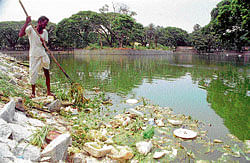
The work, part of the Environmental Action Plan (EAP), will be taken up on priority basis by the Board, after representatives of the Army and members of the Ulsoor Lake Restoration Committee recommended an early start.
BWSSB officials said sewage water normally did not enter Ulsoor Lake; it is only during rains when the stormwater drain gets flooded that sewage enters the Lake.
The Board has installed a 'silt trap' on the stretch of the stormwater drain to block garbage and other solid waste, but rain water mixed with sewage gets discharged into the lake during rains, due to the narrow SWD.
The Board will lay a 600-mm dia pipe from Nethaji Road to Wheelers' Road at the cost of Rs 1.14 crore. The work is expected to begin by next week. From Pottery Road to Wheelers' Road, 900-mm dia sub mains will be laid at a cost of Rs 90 lakh which will take six months for completion.
Tender process is on to lay separate 450-mm dia UGD lines from Davis Road to Viviani Road at a cost of Rs 10 lakh. The BWSSB will use trenchless technology from Gandhi Gram to Pottery Road where 450 mm dia pipes will be laid at a cost of Rs 45 lakh.
The BWSSB will spend Rs 2.60 crore on the whole in replacing the entire sub mains leading to Koramangala/Challaghatta Valley. The work is expected to be completed by March 2012, making the stormwater drain and Ulsoor Lake free of sewage water.
For the members of the Ulsoor Lake Restoration Committee, the struggle has lasted over a decade. Committee chairman Lt N S Narahari has been running from pillar to post to keep Ulsoor Lake clean. “The BWSSB will complete its work only next year. But the BBMP is not doing a good job of maintaining the lake. Due to official apathy, the Army is unofficially engaging themselves in de-weeding and cleaning the Lake,” he said.
S Somashekhar, BBMP's chief engineer, said the lake was not maintained for the past three-four years.
“The maintenance work was tendered a month ago, and Rs 20 lakh was earmarked for it. The fund allocated is not enough. There is also shortage of workers as five workers a day is not enough for 100 acres of lake bed,” he said.